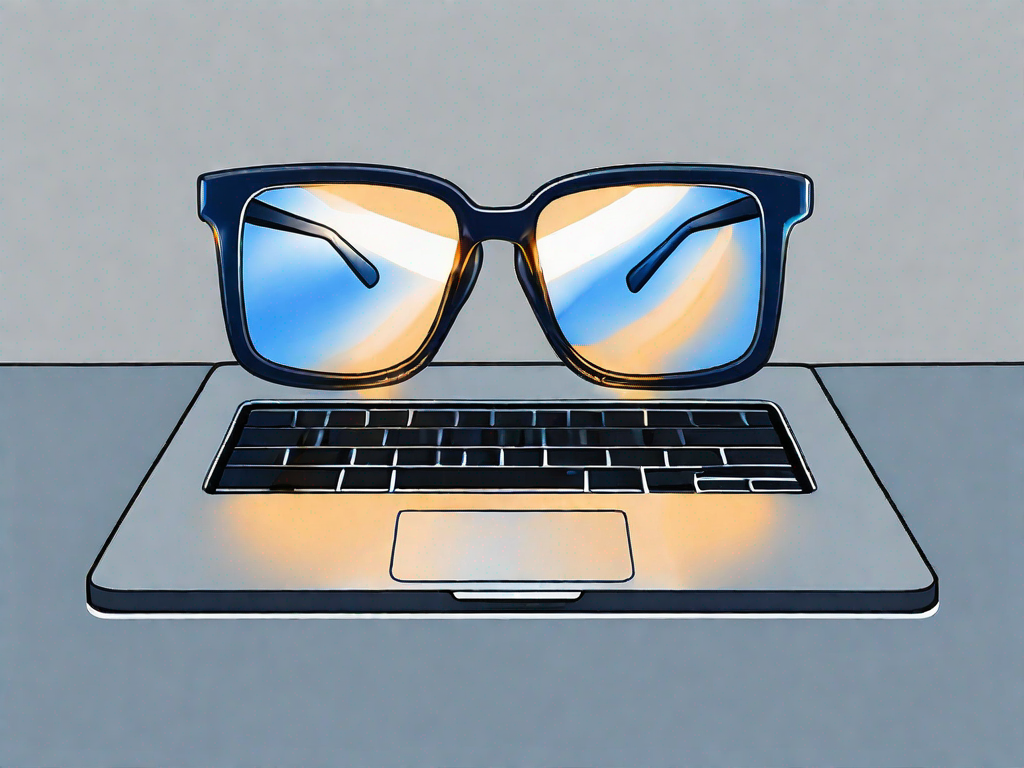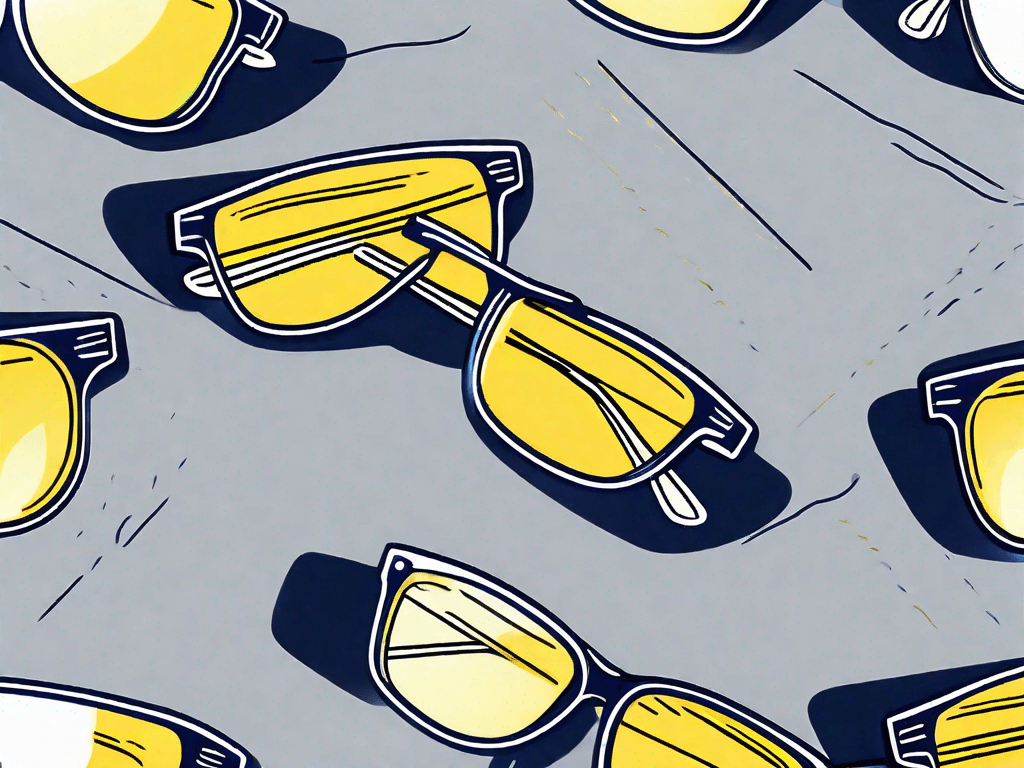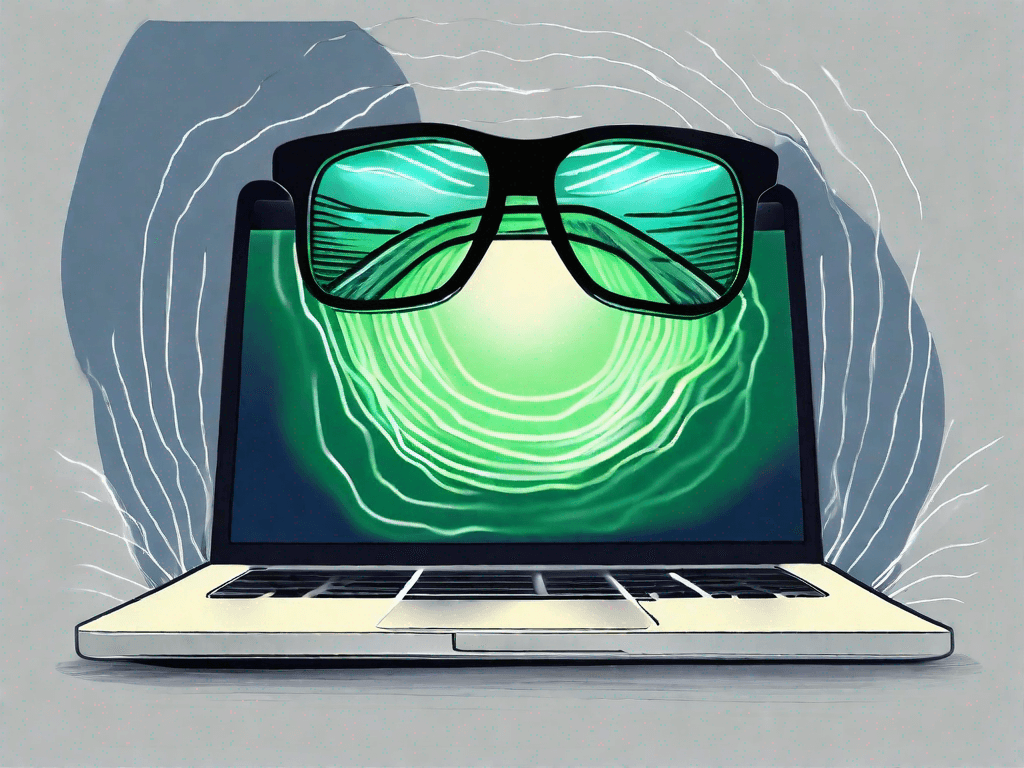Amber Blue Light Blocking Glasses: The Benefits of Wearing Them
In today's digital age, our exposure to blue light has significantly increased. Blue light is a type of high-energy visible light that is emitted by screens, such as those on our smartphones, tablets, and computers. Research has shown that overexposure to blue light can have negative effects on our health, particularly when it comes to sleep patterns and eye health. One solution to combat the harmful effects of blue light is wearing amber blue light blocking glasses. These glasses are designed to filter out the blue light, allowing us to enjoy the benefits of technology without compromising our well-being.
Understanding Blue Light: What is it?
Before delving into the benefits of wearing amber blue light blocking glasses, it's important to understand what blue light is and its impact on our bodies. Blue light is a high-energy visible light that is part of the electromagnetic spectrum. It has a short wavelength, which means it emits a higher amount of energy compared to other colors on the spectrum. Blue light is everywhere around us, not just from screens. It is present in natural sunlight, fluorescent lighting, and LED lights.
The Science Behind Blue Light
When blue light enters our eyes, it penetrates our retinas and can reach the sensitive cells at the back of our eyes. This can have a variety of effects, including disrupting our sleep patterns and causing eye strain. Exposure to blue light, especially in the evening, can interfere with the production of melatonin, a hormone that regulates our sleep-wake cycle. This can make it more difficult to fall asleep and lead to poorer sleep quality.
Furthermore, recent studies have shown that prolonged exposure to blue light can also have long-term effects on our eye health. It has been linked to an increased risk of developing age-related macular degeneration (AMD), a leading cause of vision loss in older adults. The high-energy blue light can damage the cells in the macula, the part of the retina responsible for central vision.
Moreover, blue light exposure has been found to contribute to digital eye strain, also known as computer vision syndrome. Spending long hours in front of screens can lead to symptoms such as dry eyes, blurred vision, headaches, and neck and shoulder pain. The constant exposure to blue light emitted by electronic devices can cause our eyes to work harder, leading to eye fatigue and discomfort.
Sources of Blue Light
While natural sunlight is the primary source of blue light, the increasing use of digital devices and artificial lighting has significantly increased our exposure. The screens of our electronic devices emit a high amount of blue light, especially those with LED backlighting. Additionally, energy-efficient LED lights and fluorescent bulbs also emit a significant amount of blue light.
It's worth noting that not all blue light is bad. Blue light exposure during the day can actually have positive effects on our mood, alertness, and cognitive function. It helps regulate our circadian rhythm and keeps us awake and focused. However, it's the excessive and prolonged exposure to blue light, especially in the evening and at night, that can disrupt our sleep and cause other health issues.
In conclusion, understanding the science behind blue light and being aware of its sources is crucial in today's digital age. By taking steps to protect ourselves from excessive blue light exposure, such as wearing blue light blocking glasses, we can minimize the potential negative effects on our sleep, eye health, and overall well-being.
The Concept of Amber Blue Light Blocking Glasses
Amber blue light blocking glasses are specially designed glasses that filter out blue light, particularly in the range of 400-470 nanometers. These glasses are equipped with lenses that have a yellow or amber tint, which helps to block blue light wavelengths from reaching our eyes.
Blue light is a high-energy visible light that is emitted by various sources such as the sun, digital screens, and LED lights. While blue light is naturally present in sunlight and plays a role in regulating our sleep-wake cycle, excessive exposure to artificial blue light can have negative effects on our health.
Exposure to blue light, especially in the evening and night, can disrupt our circadian rhythm, making it harder for us to fall asleep and maintain a regular sleep pattern. This can lead to sleep disorders and daytime fatigue. Additionally, prolonged exposure to blue light can cause eye strain, dryness, and discomfort, commonly known as digital eye strain or computer vision syndrome.
How Do They Work?
The amber tint in these glasses works by absorbing a significant portion of blue light, preventing it from reaching our eyes. This reduces the amount of blue light that our retinas are exposed to, providing some relief from the potential negative effects of blue light exposure. By blocking blue light, these glasses can help regulate our sleep-wake cycle and protect our eyes from strain and discomfort.
Amber blue light blocking glasses are particularly effective in filtering out blue light in the range of 400-470 nanometers, which is the range most commonly associated with the negative effects of blue light. The lenses of these glasses selectively block this specific range while allowing other wavelengths of light to pass through.
It's important to note that amber blue light blocking glasses do not block all blue light. They only filter out a portion of it, allowing some beneficial blue light to reach our eyes. This is because not all blue light is harmful; some wavelengths of blue light are essential for our overall well-being, including regulating our mood, cognitive function, and alertness.
Different Types of Blue Light Blocking Glasses
There are various types of amber blue light blocking glasses available on the market. Some glasses have a general-purpose amber tint that filters out a broad range of blue light wavelengths. These glasses are suitable for everyday use and can be beneficial for individuals who spend a significant amount of time in front of digital screens or under artificial lighting.
Others are specialized glasses that target specific blue light wavelengths, such as those emitted by digital screens. These glasses often have a more precise filtering mechanism, specifically designed to block the blue light emitted by electronic devices like smartphones, tablets, and computers. They can be particularly useful for individuals who work in front of screens for extended periods or those who are highly sensitive to blue light.
When choosing amber blue light blocking glasses, it's essential to consider factors such as lens quality, comfort, and style. High-quality lenses with a proper amber tint can effectively filter out blue light without distorting colors or reducing visual clarity. Comfortable frames that fit well on your face can ensure a pleasant wearing experience, especially if you plan to use the glasses for extended periods.
Additionally, some amber blue light blocking glasses come with added features like anti-reflective coatings, scratch resistance, and UV protection. These features can further enhance the overall functionality and durability of the glasses.
In conclusion, amber blue light blocking glasses are a valuable tool in minimizing the potential negative effects of blue light exposure. By selectively filtering out harmful blue light wavelengths, these glasses can help protect our eyes, regulate our sleep patterns, and reduce eye strain and discomfort. With the variety of options available, it's important to choose a pair of glasses that best suits your specific needs and preferences.
Health Implications of Blue Light Exposure
The increasing prevalence of digital devices and artificial lighting has led to a significant increase in blue light exposure. This overexposure can have various health implications, particularly in regards to sleep patterns and eye health.
Impact on Sleep Patterns
One of the most well-known effects of blue light exposure is its impact on our sleep patterns. As mentioned earlier, exposure to blue light in the evening can interfere with the production of melatonin, the hormone that helps regulate our sleep-wake cycle. This can result in difficulty falling asleep and disrupted sleep throughout the night. Over time, poor sleep quality can have a detrimental effect on our overall health and well-being.
Research has shown that exposure to blue light from electronic devices, such as smartphones, tablets, and laptops, can suppress the production of melatonin. This is because the blue light emitted by these devices is similar to the natural light that signals our bodies to stay awake and alert during the day. When we are exposed to this type of light in the evening, it can trick our bodies into thinking it is still daytime, making it harder for us to wind down and fall asleep.
In addition to disrupting our sleep patterns, blue light exposure at night can also affect the quality of our sleep. Studies have found that people who use electronic devices before bed or have bright artificial lighting in their bedrooms tend to have shorter sleep durations and more fragmented sleep. This can lead to feelings of fatigue, decreased cognitive function, and an increased risk of accidents and injuries.
Effects on Eye Health
Blue light exposure can also have negative effects on our eye health. Prolonged exposure to blue light from screens can cause digital eye strain, also known as computer vision syndrome. Symptoms of digital eye strain include dry eyes, eye fatigue, blurred vision, and headaches. This is because our eyes are not designed to filter out the high-energy blue light emitted by digital devices, leading to strain and discomfort.
Furthermore, studies have suggested that overexposure to blue light can contribute to the development or progression of age-related macular degeneration (AMD), a leading cause of vision loss in older adults. AMD is a condition that affects the macula, the central part of the retina responsible for sharp, central vision. The high-energy blue light can cause damage to the cells in the macula, leading to vision loss over time.
It's important to note that not all blue light is harmful. In fact, exposure to natural blue light during the day can have positive effects on our mood, alertness, and cognitive performance. However, it is the excessive and prolonged exposure to artificial blue light, especially during the evening and night, that can have detrimental effects on our sleep patterns and eye health.
To mitigate the negative effects of blue light exposure, there are several strategies that can be implemented. These include reducing screen time before bed, using blue light filters or apps that adjust the color temperature of electronic devices, and ensuring proper lighting conditions in our living and working environments. By being mindful of our blue light exposure and taking proactive measures, we can protect our sleep patterns and maintain good eye health in the digital age.
The Benefits of Amber Blue Light Blocking Glasses
Amber blue light blocking glasses offer a myriad of benefits for those who frequently use digital devices or spend significant amounts of time in front of screens.
With the increasing reliance on technology in our daily lives, it's no surprise that many of us are experiencing the negative effects of blue light exposure. However, by incorporating amber blue light blocking glasses into our routine, we can mitigate these effects and enjoy a range of advantages.
Improved Sleep Quality
By blocking blue light from reaching our eyes, amber blue light blocking glasses can help regulate our sleep patterns. Studies have shown that wearing these glasses in the evening can lead to improved sleep quality and a better overall sleep experience.
When we are exposed to blue light in the evening, it can disrupt our natural circadian rhythm and suppress the production of melatonin, the hormone that regulates sleep. However, by wearing amber blue light blocking glasses, we can allow our bodies to naturally produce melatonin, promoting a healthy sleep routine.
Reduced Eye Strain and Discomfort
One of the most noticeable benefits of wearing amber blue light blocking glasses is a reduction in eye strain and discomfort. By filtering out blue light, these glasses minimize the intensity of the light that reaches our eyes, thus reducing the strain on our eye muscles.
For individuals who spend long hours in front of screens for work or leisure activities, this reduction in eye strain can be particularly beneficial. It can alleviate symptoms such as dryness, redness, and fatigue, allowing for a more comfortable and productive screen time experience.
Potential for Enhanced Mood and Focus
In addition to the physical benefits, some individuals have reported improved mood and focus when wearing amber blue light blocking glasses. By reducing the exposure to blue light, these glasses may have a positive impact on our mental well-being.
Blue light has been linked to increased feelings of anxiety and stress, as well as a disruption in concentration. By wearing amber blue light blocking glasses, we can create a more soothing and calming environment for our eyes and mind. The reduction in eye strain and discomfort can also contribute to a more comfortable and focused work environment.
Overall, amber blue light blocking glasses provide a valuable solution for those seeking to protect their eyes and enhance their overall well-being in our digital age. By incorporating these glasses into our daily routine, we can enjoy improved sleep quality, reduced eye strain, and potentially even enhanced mood and focus.
Choosing the Right Amber Blue Light Blocking Glasses
When it comes to selecting the right pair of amber blue light blocking glasses, there are several factors to consider.
Factors to Consider
First and foremost, consider the specific purpose of the glasses. Are you looking for general-purpose glasses or specialized glasses for digital screen use? Additionally, take into account the level of blue light protection offered by the glasses. Some glasses provide higher protection than others, depending on the specific wavelengths they filter out. Lastly, consider the style and fit of the glasses to ensure maximum comfort and wearability.
Maintenance and Care Tips
To prolong the lifespan of your amber blue light blocking glasses, it's essential to practice proper maintenance and care. Clean the lenses regularly using a microfiber cloth to remove any smudges or dirt particles. When not in use, store the glasses in a protective case to prevent scratches or damage. Avoid placing them face-down on hard surfaces, as this can potentially scratch the lenses.
Debunking Common Myths About Blue Light Blocking Glasses
There are a few misconceptions surrounding blue light blocking glasses that need to be addressed.
Are They Only for Night Use?
While wearing amber blue light blocking glasses in the evening can be particularly beneficial due to their ability to regulate sleep patterns, they can also be worn during the daytime. If you spend extended periods in front of screens throughout the day, wearing blue light blocking glasses can help reduce eye strain and discomfort.
Do They Make Screen Time Completely Safe?
While amber blue light blocking glasses can significantly reduce blue light exposure, they do not make screen time completely safe. It's still important to practice healthy screen habits, such as taking breaks, adjusting screen brightness, and maintaining proper posture while using electronic devices. Combining these habits with the use of blue light blocking glasses can further enhance your eye health.
Are Amber Blue Light Blocking Glasses Worth It?
Considering the detrimental effects of blue light exposure on our health, it's clear that wearing amber blue light blocking glasses can be highly beneficial. By filtering out blue light, these glasses offer improved sleep quality, reduced eye strain, and the potential for enhanced mood and focus. However, it's important to remember that blue light blocking glasses are just one piece of the puzzle. It's also crucial to practice healthy screen habits and maintain a balanced approach to technology use. With the right combination of habits and the use of amber blue light blocking glasses, we can enjoy the benefits of technology without compromising our well-being.





